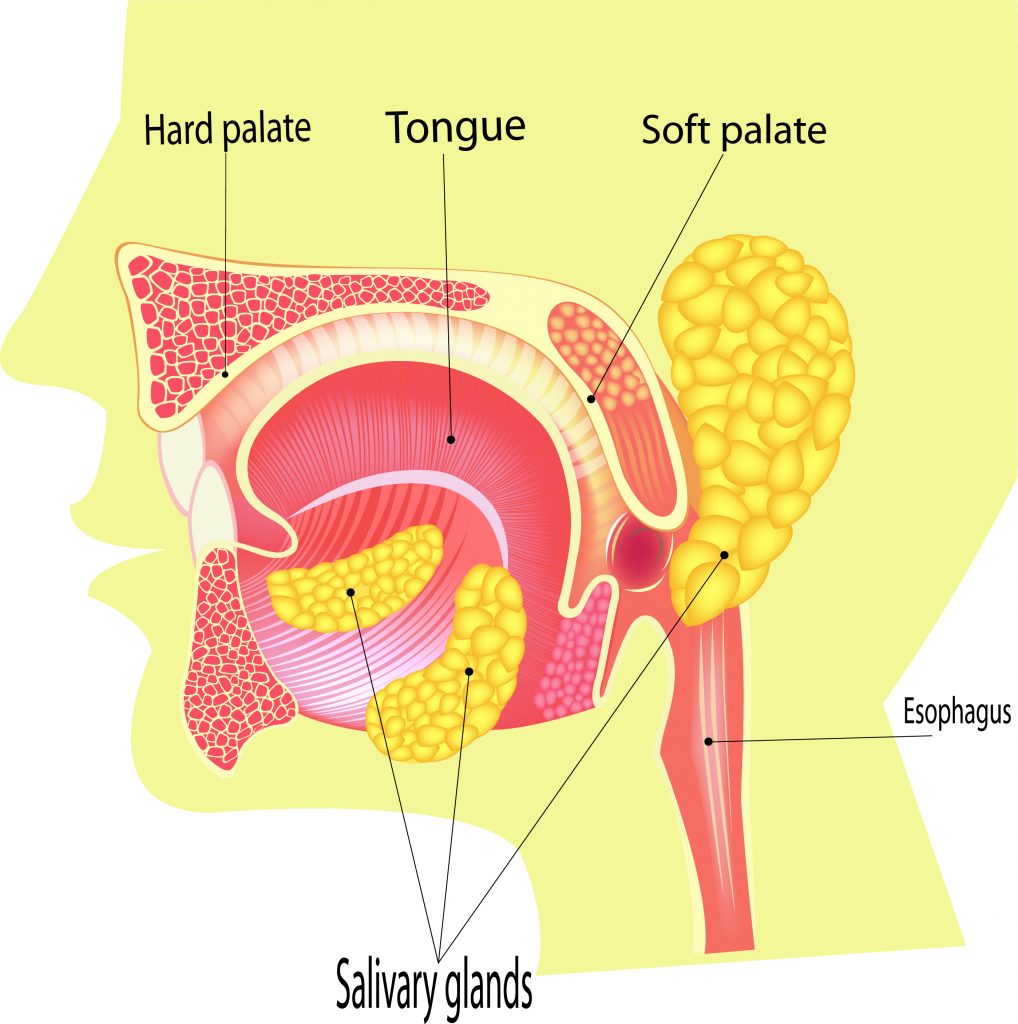The salivary glands are the small, complex system that is responsible for making and releasing saliva into the mouth. Salivary gland disorders occur when a blockage or malfunction interferes with this process. You may have a gland disorder if you are experiencing these symptoms:
- Difficulty opening the mouth
- Dry mouth
- Pain in the mouth or face
- Swelling of the neck or face
- A bad taste in the mouth
While these symptoms may overlap with those of other conditions, it’s more likely that you have a problem with the salivary gland if you’re suffering from several of them. A disorder may be located in a particular gland or affect multiple glands. There are three major salivary glands that could potentially be affected:
- Parotid glands. Located close to the ear in the upper cheek, the salivary duct in the parotid gland empties near the molars of the upper jaw.
- Submandibular glands. Under the jaw, the submandibular glands empty behind the lower front teeth.
- Sublingual glands. Beneath the tongue, the ducts empty onto the floor of the mouth.
Causes of Salivary Gland Disorders
Most gland disorders can be traced back to one of several causes.
- Obstruction. If stones form in the gland ducts, salivary flow can be obstructed. When stones are present, the gland may become infected.
- Infection. Bacterial infections can occur when the saliva pools behind an obstruction in the ducts. A cold or sore throat that infects the lymph node can also lead to secondary infection.
- Tumors. Tumors tend to appear as painless growths in a salivary gland. While some of these tumors may be benign, a malignant, or cancerous, tumor can grow quickly and may or may not be painful. Cancerous tumors can result in a loss of movement on the affected side of the face.
- Other disorders. Disorders such as Sjögren’s syndrome are associated with painful, swollen glands. Diabetes, HIV-AIDS, and autoimmune disorders may have an impact on the health of the salivary glands. In addition, alcoholics often experience gland swelling on both sides of the face.
What Are the Most Common Salivary Gland Disorders?
If you believe you may have any of the following disorders, then you should see an oral medicine specialist. Oral medicine specialists are known as “specialists of the mouth” that treat disorders of the orofacial region. They also help patients with medically-complex conditions to manage the potential impacts on their oral health.
The most common salivary gland disorders include:
Sialolithiasis (salivary gland stones). While the exact cause of gland stones is unknown, they may be related to dehydration, decreased food intake, or medications that lower saliva production. These forces may also combine to cause tiny, calcium-rich stones to form inside the salivary glands. While some stones sit inside the gland without causing symptoms, others block the gland’s duct. When the flow of saliva is obstructed, the gland will become painful and swollen.
If a stone is detected, treatment will focus on removing it. For a small stone, stimulating saliva flow (such as by sucking on a lemon) can cause the stone to pass spontaneously. In other cases, the dentist can draw on other techniques to push the stone out of the duct. Sialendoscopy is a highly effective procedure that involves tiny lighted scopes to locate the stone. Micro instruments are used to remove the stone while the patient is under local or light general anesthesia. The procedure is minimally-invasive, allowing the patient to go home the same day.

Sialadenitis (infection). This painful infection is most common among older adults with gland stones. Once the gland stone is treated, antibiotics will be prescribed to treat the infection.
Viral infections. Systemic viral infections can affect the salivary glands as well. Common viruses known to cause salivary gland infections include herpes, mumps, HIV, parainfluenza (types 1 and 2), and coxsackievirus. While there are no specific antiviral medications for salivary infections, certain medications can be prescribed to reduce and manage the symptoms of mumps, herpes, and HIV.
Cysts (tiny fluid-filled sacs). Sometimes, babies are born with cysts in the parotid gland due to ear development problems in the womb. Cysts can also develop later in life as a result of infections, stones, tumors, or traumatic injury.
Benign tumors. Non-cancerous tumors tend to form in the parotid gland. The most common type often appears as a painless lump below the earlobe. Though they generally do not metastasize or invade nearby tissues, a benign tumor can continue to grow and become deforming. Treatment involves surgical removal, although there is no urgency to do so.
Malignant tumors. Cancerous tumors of the salivary gland are rare. The only known risk factors for malignant tumors in this location are Sjogren’s syndrome and radiation exposure. The treatment method chosen largely depends upon the extent of the cancer when detected.
Sjogren’s syndrome. This autoimmune salivary gland disease causes the body to attack the salivary and lacrimal glands. The majority of people with this disease are women who begin experiencing symptoms during middle age. Half of Sjogren’s syndrome diagnoses occur in conjunction with other autoimmune diseases including rheumatoid arthritis, lupus, scleroderma, or polymyositis. While Sjogren’s syndrome cannot be cured, the disease can be managed using drugs that suppress the immune system.
Sialadenosis. This term is used to refer to an enlarged salivary gland without the presence of infection, inflammation, or tumor. The causes of sialadenosis are often associated with the use of certain drugs and with metabolic, hormonal, or nutritional disorders. Generally, no treatment is necessary.
Seek Expert Care at Penn Dental Family Practice
Penn Dental Family Practice is a leader in the field of dentistry, with expert care provided by specialists across a range of specialties. Our dental staff is comprised of professionals associated with the University of Pennsylvania School of Dental Medicine and the Children’s Hospital of Philadelphia. At our offices, you’ll benefit from the superior knowledge of dentists who are teaching the next generation. With a variety of dental disciplines available under one roof, you have access to the best in each dental specialty.
Because many people have not heard of oral medicine, those with salivary gland disorders often arrive at our offices through a doctor’s referral or after seeing one of our other specialists. No matter how you come to us, you will enjoy the advantages of The University of Pennsylvania’s institutional expertise and state-of-the-art technology for diagnostic purposes. Our dentists are experienced and highly skilled in the treatment of numerous oral disorders. To make your appointment with an oral medicine specialist, please call 215-898-7337.


